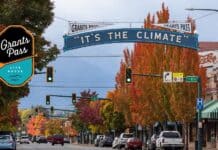“For the next 25 years we need to fund the jail appropriately,” Coconino County Sheriff Jim Driscoll said during a presentation to the Sedona City Council on Oct. 11.

With elections coming up on Tuesday, Nov. 8, Coconino County residents will be asked to vote on Proposition 445, otherwise called the Jail District Sales Tax.
While the name may be alarming, Driscoll assured council and residents that the Jail District Sales Tax is already in effect and not a new tax.
“What we’re asking the voters to do is come and vote on the extension of that tax,” Driscoll said. “The jail tax we currently have is an excise tax, not a property tax, and everyone pays. Tourists that come through the county also pay it. About 33% is paid by tourism, making it less of a burden for property owners and businesses.”
The Jail District Sales Tax currently provides $18 million of the Coconino County Detention Center’s $22 million operating budget and helps keep the crime rate down through a variety of programs funded by the tax, Discoll said.
The initial Jail District Sales Tax was passed in 1996 and allotted three-tenths of a cent excise tax for the Jail District to repay loans used to build the new jail facility to address overcrowding. The tax was also used to operate the jail and implement diversion programs.
In 2006, in an effort to address rising operational costs as well as establish substance abuse assistance programs and reduce recidivism rates, county residents passed a half-cent proposition.
The new rate accounts for 50 cents on a $100 purchase, and is the maximum amount allowed by Arizona state law. This proposition would cover most of the jail’s operating expenses and extend the tax until July 2027.
One of Driscoll’s key points for extending the tax goes beyond the day-to-day operations of the jail, and is aimed at continuing inmate programs that reduce the likelihood of someone re-offending and going back to jail.
“The problems we’ve all seen in this country is the revolving door of people coming in and out of jail,” Driscoll said. “The inmate programs we provide are designed to reduce people coming back. It’s called recidivism.”
Programs like EXODUS and mental health assistance for inmates intend to keep people from going back to jail once they’re released.
“All the programs we do are predicated on getting people the help they need. Giving them a leg up while they’re in jail so they don’t recidivate and end up coming back through that revolving door.”
The EXODUS program is a 90 day in-custody drug and alcohol treatment program that also teaches communication, anger management and parenting skills, among other useful life skills. The program is targeted at reducing recidivism and helping people improve their lives. Driscoll boasted that of the 1,600 inmates who have completed the EXODUS program, only 30% ended up back in jail, a notable statistic when compared with the national average of 70% of inmates who end up back in jail within just 12 months.
“The biggest thing this tax does is get people out of jail and keeps them from going back.” Driscoll said. If the tax were to expire, programs like EXODUS would end, creating the potential to see higher crime rates as well as overcrowding in the jail.
The city of Sedona would also see a substantial cost to house those arrested on the Coconino County side of the city at the jail, possibly placing the burden of that cost on city residents and businesses.
“I’m just hoping that we’re able to continue the programing. Because that’s what this is all about, honestly, is giving those people a chance to get back on their feet.” Driscoll said.
A virtual town hall meeting was scheduled on Tuesday, Oct. 18, after press time. The link to this meeting can be found on the Coconino County website as well as additional information about the tax.
Statement from Coconino County District 3 Supervisor Matt Ryan, who represents Sedona and Oak Creek Canyon:

“I support the continuation of the Coconino County Jail District Sales Tax – Prop 445.
“The continuation of the existing Jail District Sales Tax is critical to public safety. The jail tax funds the majority of costs associated with operating the jails including dedicated Detention Officers, medical personnel, program staff, and other critical support staff. This important public safety resource in a vital component of our criminal justice system in Coconino County.
“Programs such as Exodus provide individuals with an opportunity to change the path that may have led to their involvement with the criminal justice system. In many cases, individuals are not repeating their mistakes and are on a path to be responsible, productive citizens in our communities. Structured as a sales tax and not a property tax, the cost of operating the jail is distributed to residents in our community and the millions who visit our region each year.
“This is not a new tax or an increase. The Jail District has been in place since 1997 when it was approved by voters. With the passage of the Jail District Sales Tax, cities and towns in Coconino County were relieved of paying booking fees and daily fees for individuals booked into the County Jail by their police departments. The current sales tax funds the majority of jail operation costs. As a result, the passage of the Jail District Sales Tax extension is critical to support the current functions and programs within the jail.”



















